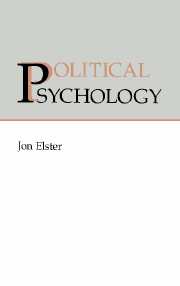Book contents
4 - Tocqueville's Psychology II
Published online by Cambridge University Press: 05 June 2012
Summary
In the last chapter I said that the basic building blocks of Tocqueville's analyses are the mechanisms of individual psychology. He was, in other words, a practitioner of methodological individualism. Of the great nineteenth-century thinkers, only John Stuart Mill and Tocqueville managed to avoid the pitfalls of an organicist and teleological position, by insisting resolutely on the need for microfoundations in the analysis of institutions and social processes. Needless to say, Tocqueville did not limit himself to the study of individual psychology. In saying that the psychological mechanisms are the basic building blocks I clearly implied that they serve to construct and explain something else. The explananda in the three major works are, as I remarked in Chapter 3, social equilibrium, long-term social mutations, and short-term social change.
In outline, the difference between the three works can be summarized as follows. In Democracy in America, Tocqueville offers an analysis of the social state of democracy, comparing it both to the aristocratic regime which preceded it and to the process of transition between one regime and the other. In that equilibrium, everything – mental attitudes no less than institutions – is endogenous and, moreover, interlinked and mutually reinforcing. In The Old Regime he also insists on the endogeneity of mental facts, but no longer assumes that they tend to perpetuate and maintain the institutions that produce them.
- Type
- Chapter
- Information
- Political Psychology , pp. 136 - 191Publisher: Cambridge University PressPrint publication year: 1993



